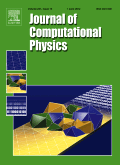
JOURNAL OF COMPUTATIONAL PHYSICS
Scope & Guideline
Bridging Theory and Practice in Computational Science
Introduction
Aims and Scopes
- Numerical Methods and Algorithms:
The journal emphasizes the development of advanced numerical methods, including finite element, finite volume, and spectral methods, aimed at solving complex partial differential equations that govern physical phenomena. - High-Order Accuracy and Stability:
A significant focus is on high-order methods that ensure accuracy and stability in simulations, especially for hyperbolic and parabolic equations, with applications in fluid dynamics and wave propagation. - Multiscale and Multiphysics Problems:
Research often addresses multiscale and multiphysics challenges, integrating different physical models and computational approaches to provide comprehensive solutions to complex real-world problems. - Data-Driven and Machine Learning Approaches:
The integration of machine learning techniques with traditional computational methods is a growing area of interest, aimed at enhancing predictive capabilities and efficiency in simulations. - Uncertainty Quantification and Sensitivity Analysis:
The journal also includes studies on uncertainty quantification in simulations, ensuring robustness and reliability in computational predictions under varying parameters and conditions. - Applications in Engineering and Natural Sciences:
Research published spans applications in engineering disciplines such as aerospace, mechanical, and civil engineering, as well as in natural sciences, particularly in fluid mechanics and materials science.
Trending and Emerging
- Physics-Informed Machine Learning:
There is a significant increase in the application of physics-informed machine learning techniques, which combine traditional numerical methods with machine learning to enhance predictive accuracy and modeling efficiency. - Adaptive Mesh Refinement Techniques:
Research has increasingly focused on adaptive mesh refinement methods, which allow for more efficient simulations by dynamically adjusting the computational grid based on the solution features. - Multiscale Modeling Approaches:
Emerging themes include the development of multiscale models that can effectively bridge different physical scales, providing more accurate representations of complex phenomena. - Hybrid Computational Techniques:
The trend of combining different numerical techniques, such as lattice Boltzmann and finite element methods, is on the rise, aiming to leverage the strengths of each method for better simulation outcomes. - Uncertainty Quantification and Robustness:
An increasing number of studies are dedicated to uncertainty quantification in computational models, addressing the need for robust solutions in the face of parameter variability and model uncertainties. - Complex Fluid Dynamics and Multiphase Flows:
There is a growing focus on complex fluid dynamics and multiphase flow problems, highlighting the need for advanced modeling techniques to capture intricate interactions in various applications.
Declining or Waning
- Traditional Finite Difference Methods:
There has been a noticeable decline in papers focused solely on traditional finite difference methods, possibly due to the emergence of more sophisticated techniques such as high-order and adaptive methods that offer better accuracy and efficiency. - Basic Lattice Boltzmann Models:
The use of basic lattice Boltzmann methods has decreased, likely as researchers move towards more complex and hybrid models that incorporate additional physics, such as multiphase flows and non-Newtonian effects. - Single-Phase Fluid Dynamics:
There appears to be a waning interest in studies exclusively dedicated to single-phase fluid dynamics, as the field increasingly incorporates multiphase interactions and complex fluid-structure interactions. - Low-Order Approximations:
Research focusing on low-order numerical approximations is declining, as there is a growing emphasis on high-order methods that can better capture the dynamics of complex systems.
Similar Journals
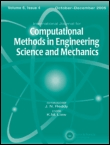
International Journal for Computational Methods in Engineering Science & Mechanics
Advancing the Frontiers of Computational EngineeringThe International Journal for Computational Methods in Engineering Science & Mechanics, published by Taylor & Francis Inc., serves as a vital resource for researchers and professionals involved in the fields of computational mathematics and mechanics. With an ISSN of 1550-2287 and an E-ISSN of 1550-2295, this journal has been a cornerstone of scholarly communication since its inception in 2005 and will continue to publish cutting-edge research through 2024. Its impressive Scopus rankings highlight its impact within the field, placing it in the top quartiles for both Computational Mechanics (Q2) and Computational Mathematics (Q3), showcasing its significance for academics striving to push the boundaries of these disciplines. The journal features high-quality peer-reviewed articles that emphasize innovative computational methods, numerical analyses, and their applications in engineering science. While currently not available as an open-access option, this publication remains an essential reference for those seeking to stay at the forefront of computational methodologies in engineering practice.

Mathematics in Engineering
Empowering engineers with the tools of mathematical analysis.Mathematics in Engineering, published by the American Institute of Mathematical Sciences (AIMS), is a premier open-access journal that has been advancing the field of mathematical sciences since its inception in 2019. With a focus on interdisciplinary applications, this journal embraces a broad spectrum of topics within analysis, applied mathematics, and mathematical physics. It has quickly garnered recognition, achieving notable rankings such as Q1 status in Analysis and Mathematical Physics, and Q2 in Applied Mathematics, according to the 2023 category quartiles. The journal’s Scopus rankings further underline its commitment to quality, with impressive placements reflecting its growing influence in the mathematical community. Accessible to all, Mathematics in Engineering aims to provide a platform for the dissemination of innovative research findings and methodologies, fostering collaboration among researchers, professionals, and students in the mathematical domain. For those looking to contribute to or deepen their understanding of current mathematical applications in engineering, this journal is an essential resource.

Applications of Mathematics
Transforming Ideas into Mathematical SolutionsApplications of Mathematics, published by SpringerNature, is a respected journal based in the Netherlands that provides a platform for innovative research in the field of applied mathematics. Since its inception in 1997 and with a convergence ongoing until 2024, the journal supports the dissemination of high-quality scholarship, although it currently holds a Q4 category ranking in the applied mathematics category, which reflects its niche importance in the academic community. Researchers and professionals in the field can access a diverse array of applied mathematical techniques and their practical applications, contributing to advancements across various disciplines. While the journal does not operate under an open access model, it is indexed and ranked in Scopus, where it holds a rank of 419 out of 635, placing it in the 34th percentile. This underscores its value and relevance in the global research landscape.
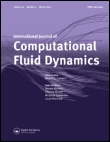
INTERNATIONAL JOURNAL OF COMPUTATIONAL FLUID DYNAMICS
Navigating the Complexities of Fluid Dynamics with PrecisionInternational Journal of Computational Fluid Dynamics, published by Taylor & Francis Ltd, is a prominent academic journal dedicated to advancing the field of computational fluid dynamics (CFD). Since its establishment in 1993, the journal has provided a platform for disseminating high-quality research, covering a wide spectrum of topics across various engineering disciplines, including Aerospace Engineering, Computational Mechanics, and Mechanical Engineering. With an impact factor placing it within Q2 categories across several relevant fields, the journal holds a significant position in the academic community, evidenced by its diverse Scopus rankings. Researchers and practitioners engage with state-of-the-art methodologies and innovative applications presented within its pages, contributing to both theoretical development and practical solutions in fluid dynamics. Though it currently operates under a subscription model, the journal remains a vital resource for those seeking to deepen their understanding of computational techniques and their application in industries spanning engineering and physics. This makes it an essential read for professionals, researchers, and students alike, striving for excellence in this dynamic and evolving area of study.

Numerical Mathematics-Theory Methods and Applications
Advancing Numerical Insights for Tomorrow's ChallengesNumerical Mathematics: Theory Methods and Applications, published by GLOBAL SCIENCE PRESS, stands as a pivotal journal in the fields of applied and computational mathematics, control and optimization, as well as modeling and simulation. With an ISSN of 1004-8979 and an E-ISSN of 2079-7338, this journal has been committed to disseminating high-quality research since its establishment in 2010, curating contributions that reflect the latest advancements in numerical methodologies and their diverse applications. As a Q2 journal in its category for 2023, it ranks favorably in the Scopus metrics, with notable positions in various mathematical disciplines. Although it does not currently provide open access, it remains an essential resource for researchers and professionals seeking to deepen their understanding of numerical methods and their applications. The journal’s esteemed reputation, coupled with its strategic focus on emerging trends in mathematics, makes it an invaluable platform for scholars who wish to contribute to and stay informed about cutting-edge developments in this dynamic field.

International Journal of Numerical Analysis and Modeling
Advancing the Frontiers of Numerical AnalysisThe International Journal of Numerical Analysis and Modeling, published by ISCI-INST SCIENTIFIC COMPUTING & INFORMATION, is a leading platform for research in the field of numerical analysis. With an ISSN of 1705-5105 and an E-ISSN of 1705-5105, this esteemed journal has been disseminating rigorous and innovative studies since its inception in 2004. Covering a diverse range of topics within numerical analysis, it has successfully positioned itself in Q2 of the 2023 category quartiles and ranks 46th out of 88 in its Scopus classification, showcasing its relevance and impact within the academic community. Operating under an open access model, it ensures that research findings are accessible to a global audience, fostering collaboration and knowledge exchange. Based in Canada, this journal not only highlights advancements in computational methodologies but also addresses real-world applications, bridging theoretical frameworks with practical solutions. Researchers, professionals, and students alike will find valuable insights and up-to-date contributions in this crucial field of study.

JOURNAL OF COMPUTATIONAL MATHEMATICS
Empowering Researchers with Robust Mathematical MethodologiesJOURNAL OF COMPUTATIONAL MATHEMATICS, published by GLOBAL SCIENCE PRESS, is a distinguished peer-reviewed academic journal dedicated to advancing the field of computational mathematics. With a focus on high-quality research that bridges theoretical and practical applications, this journal aims to disseminate innovative methodologies and robust algorithms that address complex mathematical problems. Operating without an open-access model, it maintains a reputable standing with a Q2 category classification in computational mathematics as of 2023, showcasing its influence and relevance within the academic community. The journal, which has been in publication since 1996, continues to evolve, providing a platform for researchers, practitioners, and students to engage with cutting-edge developments up to 2024. By contributing to the body of knowledge in computational mathematics, this journal plays a vital role in fostering collaboration and advancement in related disciplines.
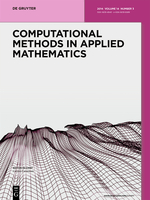
Computational Methods in Applied Mathematics
Bridging Theory and Practice in Applied MathematicsComputational Methods in Applied Mathematics is a premier academic journal published by WALTER DE GRUYTER GMBH, based in Germany. With its ISSN 1609-4840 and E-ISSN 1609-9389, this journal serves as a crucial platform for the dissemination of cutting-edge research and innovations in the fields of Applied Mathematics, Computational Mathematics, and Numerical Analysis. Notably, it has been recognized in 2023 with a Q2 ranking in its category quartiles, marking it as a significant contributor in its discipline. Spanning from 2001 to 2024, it fosters interdisciplinary collaboration and exploration of computational methodologies that solve complex mathematical problems. Though it operates on a traditional access model, its relevance is underscored by its Scopus rankings, which place it among the notable leaders in its area. As a trusted source of scholarly articles, Computational Methods in Applied Mathematics is an essential resource for researchers, professionals, and students aiming to stay abreast of advancements and discussions that shape the future of applied mathematics.
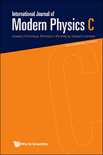
INTERNATIONAL JOURNAL OF MODERN PHYSICS C
Connecting Scholars to the Latest in Physics ResearchINTERNATIONAL JOURNAL OF MODERN PHYSICS C, published by WORLD SCIENTIFIC PUBL CO PTE LTD, is a pivotal platform for disseminating groundbreaking research in the fields of computational theory, mathematical physics, and statistical physics. With an ISSN of 0129-1831 and an E-ISSN of 1793-6586, this esteemed journal, based in Singapore, serves a global audience of researchers and professionals who are dedicated to pushing the boundaries of knowledge in modern physics. The journal's rigorous selection process ensures the inclusion of high-quality articles that advance the understanding and application of complex theoretical concepts. Currently, the journal holds a commendable Q3 quartile ranking across several categories, including Computational Theory and Mathematics and Statistical and Nonlinear Physics, reflecting its influence and relevance in the academic community. Covering a wide array of topics from 1996 to 2024, the INTERNATIONAL JOURNAL OF MODERN PHYSICS C is not just a repository of research; it is a critical resource for students and scholars aiming to stay at the forefront of modern scientific inquiry.
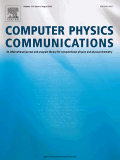
COMPUTER PHYSICS COMMUNICATIONS
Exploring the Synergy of Computing and PhysicsCOMPUTER PHYSICS COMMUNICATIONS is a premier journal published by Elsevier, renowned for its contributions to the fields of computer science and physics. With an ISSN of 0010-4655 and an E-ISSN of 1879-2944, this journal has established itself over the decades, beginning its journey in 1969 and running through 2025, fostering innovative research and discussions. Recognized for its high impact, it sits in the Q1 quartile for both Hardware and Architecture as well as for miscellaneous Physics and Astronomy, underscoring its significance in the academic community. The journal's Scopus rankings further reflect its prestige, with a rank of #12 out of 177 in Computer Science and #18 out of 243 in Physics and Astronomy, placing it in the top percentiles of its field. Although it does not currently offer Open Access options, COMPUTER PHYSICS COMMUNICATIONS remains a vital resource for researchers, professionals, and students seeking to advance their knowledge and contribute to the ongoing dialogue in computer physics and its myriad applications.